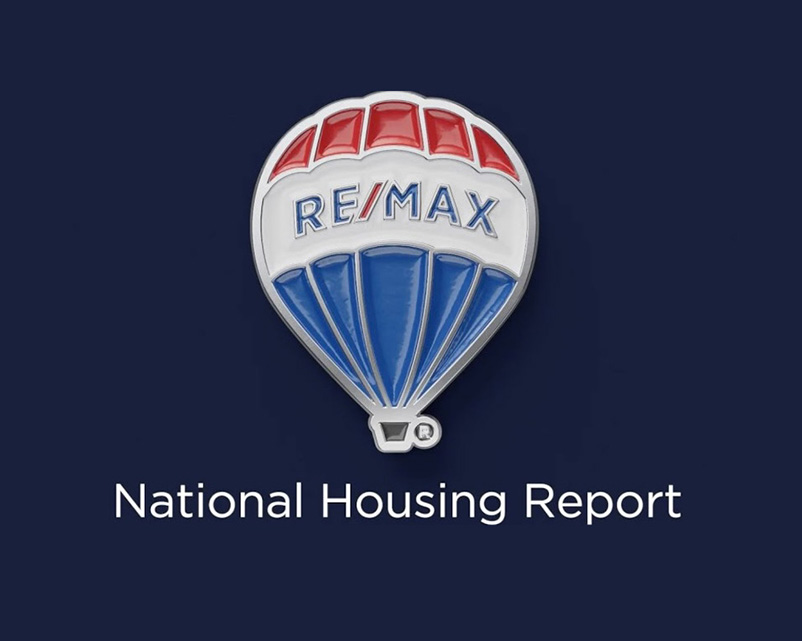Inventory Gains and a Surge of New Listings Highlight a March in Which Sales Climbed from February 2024 But Trailed March 2023
Home sales in March increased 21.6% over February while trailing the March activity of a year ago. At the same time, a 20.9% surge in new listings during the month fueled a substantial 7.7% expansion in inventory.
The inventory gains helped expand the supply of homes for sale by 24.2% year over year, setting the stage for the customary peak homebuying season of May and June.
“As we move into what is normally the prime homebuying months, the increased inventory should give buyers more options and a better chance at securing a home that fits their needs,” says Amy Lessinger, RE/MAX® President. “It’s still a seller’s market in many parts of the country, but having a greater volume of available listings is a good step toward a more balanced market.”
Anthony Askowitz, Broker/Owner of RE/MAX Advance Realty in Miami, FL, agrees that March’s activity was a good sign for what could come. “March is always a hot time for the real estate market in Miami and this year was no different. Demand was strong, prices increased and, although homes took just a bit longer to sell, thankfully new construction added to the inventory to help meet the needs of new residents.”
Up 5.1% year over year, the Median Sale Price increased 1.5% from February – the third monthly increase in a row – and returned to $415,000, a figure it last reached last September.
Other metrics of note:
• While March’s 21.6% jump in sales was the largest monthly gain in a year, it lagged the 37.7% increase in March 2023 and 33.2% increase in March 2022.
• March home sales finished 9.4% below a year ago across the 50 metro areas surveyed. One factor in the comparison is that the Easter holiday weekend occurred in March this year, but in April last year.
• The March months’ supply of inventory was 1.7, compared to 1.9 in February and 1.4 one year ago.
• Days on market dropped by 4 days from February to 40 days – the same number as in March 2023.
• On average, March sellers received 99% of the listing price, the same as sellers in February and those one year ago.
Highlights and local market results for March include:
Closed Transactions
In the 50 metro areas surveyed in March 2024, the overall number of home sales was up 21.6% compared to February 2024 and down 9.4% compared to March 2023.The markets with the biggest decrease in year-over-year sales percentage were Dover, DE at -25.9%, Honolulu, HI at -16.5%, and Miami, FL at -16.3%. The markets with the biggest increase in year-over-year sales percentage were Bozeman, MT at +10.7%, Burlington, VT at +10.2%, and Minneapolis, MN at +10.0%.
Median Sales Price – Median of 50 metro area prices
In March 2024, the median of all 50 metro area sales prices was $415,000, up 1.5% compared to February 2024, and up 5.1% from March 2023. The markets with the biggest year-over-year decrease in median sales price were San Antonio, TX at -4.4%, Burlington, VT at -4.3%, and Fayetteville, AR at -2.9%. The markets with the biggest year-over-year increase in median sales price were Manchester, NH at +14.5%, New York, NY at +14.0%, and Hartford, CT at +13.5%.
Close-to-List Price Ratio – Average of 50 metro area prices
In March 2024, the average close-to-list price ratio of all 50 metro areas in the report was 99%, flat compared to both February 2024 and March 2023. The close-to-list price ratio is calculated by the average value of the sales price divided by the list price for each transaction. When the number is above 100%, the home closed for more than the list price. If it’s less than 100%, the home sold for less than the list price. The metro areas with the lowest close-to-list price ratio were Miami, FL at 94% and Bozeman, MT at 95%. The metro areas with the highest close-to-list price ratios were San Francisco, CA at 105% and Hartford, CT at 104%.
Days on Market – Average of 50 metro areas
The average days on market for homes sold in March 2024 was 40, down four days compared to the average in February 2024, and flat compared to March 2023. The metro areas with the lowest days on market were Baltimore, MD and Washington, DC, tied at 13, followed by a three-way tie between Dover, DE, Philadelphia, PA, and Trenton, NJ at 18. The highest days on market averages were in Fayetteville, AR at 79, San Antonio, TX at 76, and Bozeman, MT at 66. Days on market is the number of days between when a home is first listed in an MLS and a sales contract is signed.
Months’ Supply of Inventory – Average of 50 metro areas
The number of homes for sale in March 2024 was up 7.7% from February 2024 and up 24.2% from March 2023. Based on the rate of home sales in March 2024, the months’ supply of inventory was 1.7, down from 1.9 in February 2024, and up from 1.4 in March 2023. In March 2024, the markets with the lowest months’ supply of inventory were Seattle, WA at 0.6, followed by a tie between Manchester, NH and Milwaukee, WI at 0.7. The markets with the highest months’ supply of inventory were Miami, FL at 4.1, San Antonio, TX at 4.0, and Bozeman, MT at 3.3.
As one of the leading global real estate franchisors, RE/MAX, LLC is a subsidiary of RE/MAX Holdings (NYSE: RMAX) with more than 140,000 agents in over 9,000 offices and a presence in more than 110 countries and territories. Nobody in the world sells more real estate than RE/MAX, as measured by residential transaction sides. RE/MAX was founded in 1973 by Dave and Gail Liniger, with an innovative, entrepreneurial culture affording its agents and franchisees the flexibility to operate their businesses with great independence. RE/MAX agents have lived, worked and served in their local communities for decades, raising millions of dollars every year for Children’s Miracle Network Hospitals® and other charities. To learn more about RE/MAX, to search home listings or find an agent in your community, please visit www.remax.com. For the latest news about RE/MAX, please visit news.remax.com.
Report Details
The RE/MAX National Housing Report is distributed monthly on or about the 15th. The Report is based on MLS data for the stated month in 50 metropolitan areas, includes single-family residential property types, and is not annualized. For maximum representation, most of the largest metro areas in the country are represented, and an attempt is made to include at least one metro area in almost every state. Metro areas are defined by the Core Based Statistical Areas (CBSAs) established by the U.S. Office of Management and Budget.
Definitions
Closed Transactions are the total number of closed residential transactions during the given month. Months Supply of Inventory is the total number of residential properties listed for sale at the end of the month (current inventory) divided by the number of sales contracts signed (pending listings) during the month. Where “pending” data is unavailable, an inferred pending status is calculated using closed transactions. Days on Market is the average number of days that pass from the time a property is listed until the property goes under contract. Median Sales Price for a metro area is the median sales price for closed transactions in that metro area. The nationwide Median Sales Price is calculated at the nationwide aggregate level using all sale prices from the included metro areas. The Close-to-List Price Ratio is the average value of the sales price divided by the list price for each closed transaction.
MLS data is provided by Seventy3, LLC, a RE/MAX Holdings company. While MLS data is believed to be reliable, it cannot be guaranteed. MLS data is constantly being updated, making any analysis a snapshot at a particular time. Every month, the previous period’s data is updated to ensure accuracy over time. Raw data remains the intellectual property of each local MLS organization.

